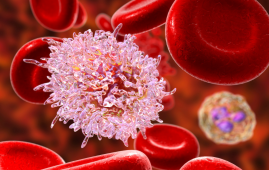

A new preclinical study from the Sylvester Comprehensive Cancer Center reports that expanding regulatory T cells (Tregs) before allogeneic stem cell transplants may significantly reduce GVHD, protect vital organs, and support healthier microbiome recovery, all while preserving anti-cancer immune activity.
A New Safety Pathway for Allogeneic Stem Cell Transplants
Patients undergoing allogeneic stem cell transplants face a substantial risk of graft-versus-host disease (GVHD), which is often managed with broad-spectrum immunosuppressant drugs that increase vulnerability to infections. The new Treg-expansion strategy offers a safer, more targeted alternative by preparing the immune system before transplantation rather than suppressing it afterward.
Explore All Hematology CME/CE Conferences and Online Courses
Treg Expansion Reduces GVHD and Protects Key Organs
Led by Robert Levy, Ph.D., researchers tested a dual-agent protocol using TL1A-Ig fusion protein and low-dose IL-2 to stimulate Tregs through TNFRSF25 and CD25 receptors. This approach expanded active Tregs into tissues frequently damaged by GVHD, including the colon, liver, and eye.
Key preclinical benefits included:
- Improved survival after transplant
- Reduced GVHD scores and weight loss
- Stronger tissue health
- More diverse, stable gut microbiome
- Preservation of graft-versus-leukemia activity
The ability to lower GVHD risk without compromising anti-cancer immunity is an important finding for clinicians managing complex hematologic conditions.
Toward Practical, Patient-Centered Transplant Strategies
Unlike earlier methods that manipulate cells outside the body, this protocol expands the patient’s own Tregs internally, offering a simpler and potentially more scalable approach. The findings also highlight the impact of gut microbiome balance on transplant outcomes, an increasingly important consideration in transplant medicine.
For specialists working with allogeneic stem cell transplants, this research highlights a future where immune modulation is precise and protective rather than broadly suppressive.
The research team, spanning Sylvester, Sloan Kettering Institute, Weill Cornell, and Fred Hutchinson Cancer Center, is now working to advance this therapy toward clinical evaluation. If successful, it may help set a new standard for safer recovery, improved quality of life, and reduced complications for patients.
Source:
more recommended stories
 Phage Therapy Study Reveals RNA-Based Infection Control
Phage Therapy Study Reveals RNA-Based Infection ControlKey Takeaways (Quick Summary) Researchers uncovered.
 AI in Emergency Medicine and Clinician Decision Accuracy
AI in Emergency Medicine and Clinician Decision AccuracyEmergency teams rely on rapid, accurate.
 Innovative AI Boosts Epilepsy Seizure Prediction by 44%
Innovative AI Boosts Epilepsy Seizure Prediction by 44%Transforming Seizure Prediction in Epilepsy Seizure.
 Hypnosis Boosts NIV Tolerance in Respiratory Failure
Hypnosis Boosts NIV Tolerance in Respiratory FailureA New Approach: Hypnosis Improves NIV.
 Bee-Sting Microneedle Patch for Painless Drug Delivery
Bee-Sting Microneedle Patch for Painless Drug DeliveryMicroneedle Patch: A Pain-Free Alternative for.
 AI Reshapes Anticoagulation in Atrial Fibrillation Care
AI Reshapes Anticoagulation in Atrial Fibrillation CareUnderstanding the Challenge of Atrial Fibrillation.
 Hemoglobin as Brain Antioxidant in Neurodegenerative Disease
Hemoglobin as Brain Antioxidant in Neurodegenerative DiseaseUncovering the Brain’s Own Defense Against.
 Global Data Resource for Progressive MS Research (Multiple Sclerosis)
Global Data Resource for Progressive MS Research (Multiple Sclerosis)The International Progressive MS Alliance has.
 AI Diabetes Risk Detection: Early T2D Prediction
AI Diabetes Risk Detection: Early T2D PredictionA new frontier in early diabetes.
 Cancer Cells Learn to Self-Report: A New Frontier in Immunotherapy
Cancer Cells Learn to Self-Report: A New Frontier in ImmunotherapyHow a Drug Complex Enables Immune.

Leave a Comment